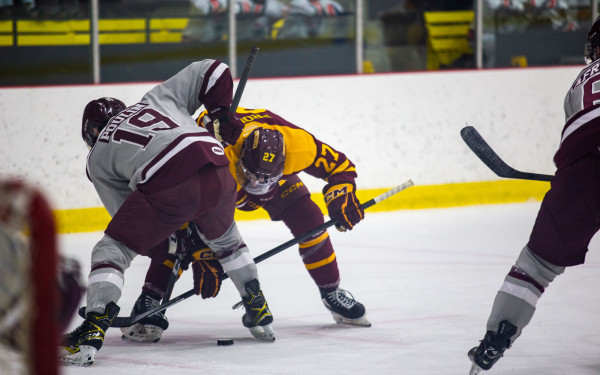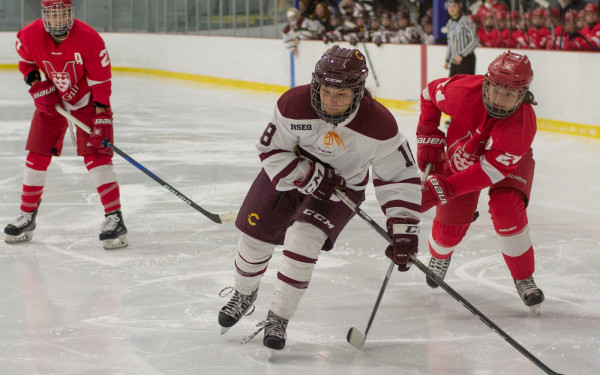On the pursuit of happiness
Perseverance and belief drives local golfer through the mud on his quest to the pros
When James Colin Davis packed his car for Florida in 2015, he was leaving one chapter of his life behind and driving toward something new. Davis wasn’t headed south for margaritas on the beach, though. He was going there to work.
As he arrived at his destination just north of Tampa, Florida, his office didn’t look or sound traditional. There were no cubicles, filing cabinets, computers, or phones ringing.
Instead, there were bunkers, water hazards, fairways, and birds chirping. It was an 18-hole golf course—one of four at the Innisbrook Golf Resort—and one of many he’s played since.
What’s unique about Davis’ office is it never looks the same. Week-by-week, tournament-by-tournament, the 34-year-old is challenged to unravel the riddles that a new golf course throws at him. In the clubhouse, there lies the prize: a trophy and a paycheque—but one reserved solely for he who solves it best.
Davis began playing golf when he was 13 years old as a junior member at Whitlock Golf & Country Club in his hometown of Hudson, Quebec. When he was 18, he decided to put his clubs away to focus on other things and it wasn’t until nearly ten years later when he brought them out again.
What started off as casual golf on the weekends, quickly turned into a whole lot more. When Davis realized he still had game, and recognized that he wasn’t particularly happy working as a technical producer, a light bulb came on in his head. It was time to make the switch.
As he drafted his resignation letter, he got a call from the American head office at EVS Broadcast Equipment asking him to fly down the following week for a meeting. That part wasn’t unusual. What was, however, was their plan to send Davis home just one day later.
Davis clued in on what was happening and so he decided to hold onto his resignation letter. Not long after, he learnt that they were closing the Montreal office and that he was being laid off. Fortunately for Davis, a severance package came with his dismissal. With that money, Davis packed his bags and his golf clubs, and left for Florida.
When Davis left the broadcast industry six years ago, he was leaving a business where job security was anything but secure, and diving into a new career where the money was even less of a guarantee.
“I’ve always been the one that has to do something I enjoy,” said Davis. “Financially, it's a much more stressful situation that I put myself into, but the flip side is that I'm motivated to work because I'm passionate about what I'm doing.”
In one sense, gambling is a way of losing yourself––losing your value, your worth. But in its other form, it can be the complete opposite. Not so much a way of finding yourself or your value, but better yet, proving it—and that’s what Davis was going to do. He believed in his abilities, so he bet on himself.
“Until I’ve had the opportunity to go out and compete for a couple of years when my body is allowing me to do what I need to do, I’m not going to feel like I’ve really given myself a good chance.” — James Colin Davis
No, we aren’t talking about gambling, literally––that would be borderline illegal. Rather, a hypothetical bet on the outcome that would emanate from a risk-taking decision with major implications on the future of Davis’ career. While the wager was large, the potential payout was even larger.
“I hadn't practiced at all but I just kind of went out and I was shooting the same score as I was shooting as a teenager,” he said. “Seeing that, having put literally no work into it, there was just kind of this immediate belief that if you were to just commit yourself to it that your ceiling is kind of endless,” Davis added.
In a continental climate that allows for only five or six months of quality golf every year, navigating the professional golf scene as a Canadian is challenging; and doing so as an amateur is an even tougher test.
“I was literally just bleeding money,” said Davis about his time as an amateur, before turning pro.
“Golf is a brutal game,” he admitted. “If it's a two day event, you can play 35 great holes, have one bad bounce or one bad shot, and that can take you out of the money. It's always kind of a gamble.”
As a golf professional playing on mini tours, money is an inevitable factor. Not everyone can be Tiger Woods, but everyone still has bills to pay. Davis says when he steps on that first tee, however, money is not on his mind.
“If you're thinking about, ‘Oh, I need to win because I have bills to pay’ or whatever, it's never gonna work in your favor, right? You just gotta go and play the game and see where it falls at the end of the week,” he said.
For Davis, it was falling, alright, but not in his favour. The 2018 and 2019 summers were seasons where Davis was plagued by injuries, and then we all know what happened in 2020.
What was supposed to be a bounce-back season for Davis ended up being one that was heavily affected by the pandemic, adding insult to injury in what was already a bruising start to Davis’ career.
“There’s been a lot of hurdles that I've had to jump over in the last four years since turning pro,” Davis said. “It was a very steep learning curve when I turned pro and then two years in a row of struggling through injuries was really tough.”
Sometimes life will throw you curveballs and when you strike out, your response will become the defining moment of your future. Are you going to hang your head in the dugout and throw in the towel, or are you going to step up to the plate next time around and knock the ball out of the park?
It’s been far from the perfect storm for Davis thus far, but his response to the adversity is what continues to write his story.
“I'm stubborn like that. Until I've had the opportunity to go out and compete for a couple of years when my body is allowing me to do what I need to do, I'm not going to feel like I've really given myself a good chance,” Davis said.
When the East Coast Pro Tour announced they would be holding five events last summer despite the pandemic, there was hope for Davis. It was finally an opportunity to stop the bleeding, and this time Davis made sure the bandage wasn’t coming off.
At the Quality Inn Sept-Îles Invitational on Sept. 3 and 4, 2020, Davis––who currently sits at number 10 on the ECPT Power Rankings––and his playing partner, Vaita Guillaume, brought a two-stroke lead into the final hole. After Guillaume stuck his approach shot close on the last hole, Davis was able to tuck home a seven foot birdie putt to put a stamp on the victory and a $7,000 cheque––his first as a professional.
“For lack of better words [it was] just amazing,” said Davis. “I had to sit on the wheel of my golf cart for a couple minutes and just breathe 'cause it was a long time coming. There was a huge, huge sense of relief.”
Since he turned pro in 2017, Davis’ potential has been incubating under the eyes of the golf gods, and with the 2021 season knocking at the door, it’s only a matter of time that it comes to life. With the pre-season ramping up, his goals for this year are set in stone.
“This summer, I'd like to go out and have multiple wins in Quebec and Ontario; medium-term is to go to Q-School for, ideally, the Korn Ferry Tour, if not for the Canadian Tour; and long-term is still to get on the PGA Tour.”
On the golf course, Davis never thinks too far ahead. He plays the game one shot at a time, and on this rollercoaster of a ride it’s been, he’s learning to live it much of the same way: one day at a time.






4_600_375_90_s_c1.jpg)
